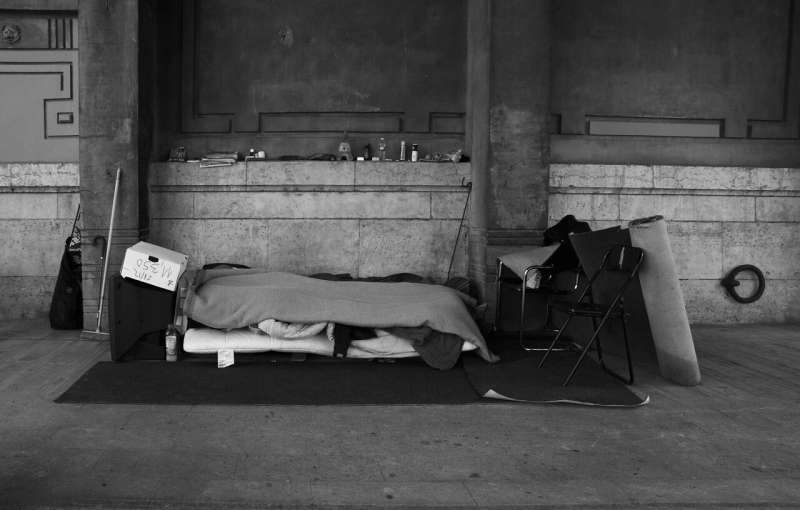Hotel housing improves well-being of individuals experiencing homelessness

Housing individuals experiencing homelessness in hotel settings rather than congregate shelters is not a new concept. But the COVID-19 pandemic, which raised concern about reducing the spread of the SARS-CoV-2 virus, escalated hotel use to a scale not previously seen.
And in the end, using hotels for temporary housing had a positive impact on the lives of people who found shelter there—something that could have implications for future ways of addressing homelessness in general.
That's the conclusion of a Yale School of Public Health research study that appears in the Aug. 30 edition of the journal Housing Policy Debate.
YSPH student Leah Robinson, MPH '22 (Health Policy), the study's lead author, interviewed 18 people who had been moved from shelters or unsheltered settings to two New Haven hotels. They said hotel living provided stability through having a consistent room, access to important amenities, and a sense of privacy and safety. Robinson said many of the residents were eventually able to move from the hotels to permanent housing.
Robinson said she was surprised by how much of a difference seemingly small changes made in the lives of those who moved to a hotel.
For many individuals in the study, gaining access to a cabinet to store food, having a private bathroom, and having electrical outlets that could be accessed at any time of day, helped them gain more control over their time and schedule, and "made huge differences in terms of improving their health and well-being," said Robinson, now a research scientist with the New York City Department of Social Services.
In March 2020, former President Donald Trump signed an executive order enabling funds from the Federal Emergency Management Agency (FEMA) Public Assistance program to be used to cover 75% of costs related to non-congregate sheltering for people experiencing homelessness.
That same month, New Haven moved individuals living in two congregate shelters into the Village Suites Hotel, a suite-style long-term stay hotel that provides residents an individual kitchenette and bathroom in every room. Despite the residents' relocation, shelter staff continued to provide services such as meals, case management, and housing assistance, and the shelter rules (no alcohol use, drug use, fighting, or guests) remained in place.
In December 2020, New Haven contracted with La Quinta, a standard short-term stay hotel, to operate its warming center program. Rooms there have their own bathroom and storage space for food, but no kitchenette, though residents did have access to microwaves in the lobby and laundry in the basement.
Investigating the impact hotel housing can have on housing insecure individuals was not new to Robinson, who did similar research for the New York City Department of Homeless Services prior to enrolling at YSPH.
"One of the projects I was tasked with during the spring and summer of 2020 was going to some of the hotels … and meeting with shelter staff to collect feedback on how things were going," Robinson said. "In these conversations, staff expressed a number of observations about how the shift to the hotel setting was impacting shelter residents' health and well-being."
When she got to YSPH, Robinson connected with the Housing and Health Equity Lab, directed by Associate Professor Danya Keene, Subsequently, when Margaret Middleton, director of the New Haven-based non-profit organization Columbus House, approached the lab about a need to evaluate the impact of hotel housing on the homeless, Robinson stepped in to help. She designed a qualitative study to systematically compare the two types of shelter structures (congregate setting vs. individual rooms) with assistance from Keene and lab manager Penelope Schlesinger. Keene and Schlesinger, who are both affiliated with the YSPH Department of Social and Behavioral Health Sciences, are co-authors of the study.
The study determined that residents found more peace of mind in the individual rooms (or shared rooms with one other person) than in an open room with 50 to 60 other people. Many of those interviewed said they had to be constantly "on guard" or "on point" at shelters, which added to the high stress levels that came from the uncertainty of their living situations. They also worried about a lack of control in their lives; the constant fear of having their belongings stolen; and of having a secure place to leave their belongings, as they had to be out of the shelters by 7 a.m. and remain outside until 5 p.m. Also, the lines for first-come, first-serve shelter space can start forming hours before opening, which creates barriers to finding and maintaining employment.
While living in a hotel was beneficial, many study participants said they still felt a "tremendous" amount of stress due to uncertainties surrounding how long the hotel stay would last, and the fear of having to go back to a shelter or the streets.
"I found the most difficult aspect of this research to be the reality that while the hotels were much better in a lot of ways as compared to the congregate spaces or unsheltered locations people were coming from, a 'better' shelter is still a shelter, and is still only a temporary solution," Robinson said.
Making small changes at shelters, such as installing wifi or safe, secure storage spaces for belongings, would make the lives of the homeless at least a little easier, Robinson said. But that doesn't address the larger problem. "Right now, improving the shelter environment is important," she said. "However, working to incorporate those elements into shelter spaces doesn't truly get at the root of the problem, which is that we have a shortage of permanent, affordable housing that is at a crisis level."
More information: Leah Robinson et al, "You Have a Place to Rest Your Head in Peace": Use of Hotels for Adults Experiencing Homelessness During the COVID-19 Pandemic, Housing Policy Debate (2022). DOI: 10.1080/10511482.2022.2113816
Provided by Yale University




















